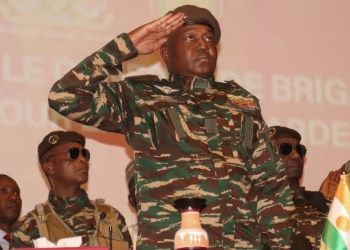Kenyans were gripped with anticipation on Friday as former Prime Minister Raila Odinga faced a pivotal moment in his bid for the African Union Commission (AUC) chairmanship. After months of intense campaigning across the continent, Raila’s fate will be decided on Saturday in a high-stakes election.
His candidacy has sparked national interest, given its potential impact on Kenya’s political landscape, particularly the 2027 presidential race. Raila is contesting against Djibouti’s Foreign Affairs Minister Mahmoud Ali Youssouf and Madagascar’s Richard Randriamandrato.
As the final vote nears, the atmosphere across Kenya is charged with both optimism and anxiety, reminiscent of the tension surrounding general elections. Discussions on the AUC election have dominated social media, mainstream news, and public spaces. In Nairobi, some organizations have set up big screens for live streaming, while a lobby group, ‘Baba For AUC,’ has organized a public watch party at Sunken Car Park. Similar events are being planned in Raila’s strongholds, with delegations of leaders and supporters traveling to Addis Ababa in solidarity.
Prime Cabinet Secretary Musalia Mudavadi confirmed that a significant number of Kenyans had made their way to Ethiopia to support Raila. Reports indicate that at least 100 MPs and government officials have flown in, while county assemblies in Raila’s strongholds, including Kisumu, Siaya, Migori, and Homa Bay, have seen mass absences as MCAs joined the delegation.
However, Raila’s campaign faces last-minute hurdles. On Thursday, the Southern African Development Community (SADC) instructed its 16 member states to support Randriamandrato, potentially weakening Raila’s position. SADC’s members include key nations such as South Africa, Tanzania, and Angola. Despite this, Raila has received backing from influential leaders, including Rwanda’s President Paul Kagame, who publicly endorsed him, citing his past contributions as AU High Representative for Infrastructure.
With voting imminent, Raila and his team have intensified last-minute negotiations with heads of state and government in Addis Ababa. Analysts agree that these final diplomatic maneuvers could sway the outcome.
Back home, political leaders from various parties have publicly declared their support for Raila. Wiper leader Kalonzo Musyoka praised his dedication to democracy, calling him one of Africa’s most consequential statesmen. Former Deputy President Rigathi Gachagua emphasized Raila’s ability to unify Anglophone and Francophone Africa, while National Assembly Speaker Moses Wetang’ula lauded his commitment to Pan-Africanism and good governance.
Beyond Raila’s candidacy, the election is also a significant test for President William Ruto. A win for Raila would elevate Ruto’s stature as a key player in African diplomacy, showcasing his ability to rally the continent behind Kenya’s candidate. Domestically, such a victory could reshape the political landscape, positioning Ruto to gain support from Raila’s traditional voter base of over five million people ahead of the 2027 elections.















